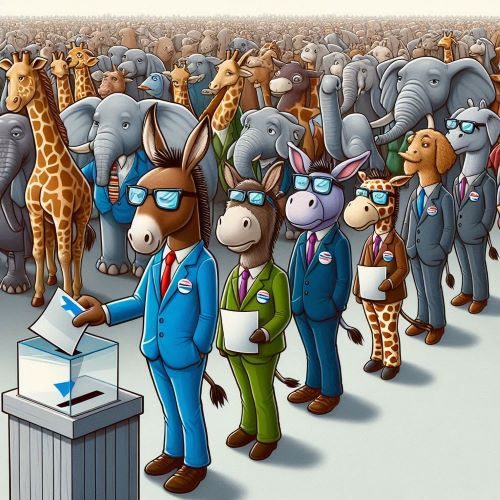Are you Vote Donkeys?
As sudden thunder hit my ears, I tried to awaken but couldn’t. Politics, political parties, debates over political rights—this is our time, claims of who will win, arguments over who is the best leader, who has improved the economy and established stability—these thoughts swirled around me. There were too many noises around me. I tried to wake up again amidst the noise but couldn’t. Was I hallucinating? Was this a dream? It felt like I was in a place resembling “Argalaya Land in Golf Face,” still running.
However, as I finally woke up, I realized that elections were just around the corner. I found myself in another land, almost like a dream world filled with donkeys. I wondered what I could do, feeling disheartened that true leaders may never emerge in this land.
Suddenly, I fell back into the world of donkeys in my sleep. I witnessed these symbolic donkeys amidst people’s noise, fighting, shouting, burning, and firing. I wanted to put an end to this nonsense that had continued for the past 77 years. As I woke up, I remembered teachings, and in my dream, I felt compelled to convey this message to the world.
Exploring the Donkey Realm of Politics:
The Grand Old Donkey (GOD)
The Grand Old Donkey (GOD) stands as the oldest and most traditional party in the political landscape. Like a steadfast mule, GOD promises stability rooted in long-established principles. However, critics argue that its reluctance to embrace change may hinder progress. Voters must consider whether GOD’s commitment to tradition outweighs the potential benefits of innovation and adaptation.
The New Age Donkey (NAD)
In contrast, the New Age Donkey (NAD) represents a newer generation of leadership characterized by innovation and modernity. This party, akin to a sleek racehorse, emphasizes youthfulness and tech-savvy solutions to contemporary issues. However, NAD’s untested policies raise uncertainties about its ability to sustain momentum and deliver on promises. Voters are tasked with evaluating whether NAD’s potential outweighs concerns about inexperience.
The Rebel Donkey (RAD)
Lastly, the Rebel Donkey (RAD) defies conventional norms and challenges the status quo with its unconventional approach. Similar to a wild stallion, RAD brings unpredictability to the political arena, appealing to those seeking bold change. Yet, RAD’s departure from traditional ideologies can be both refreshing and unsettling. Voters must decide whether they are prepared for a dynamic shift in governance or prefer the stability of familiar paths.
Additional Types of Donkeys:
The Regional Donkey (RED)
The Regional Donkey (RED) advocates for regional or ethnic interests within the country, emphasizing specific geographical or cultural communities.
The Issue-Based Donkey (IBD)
The Issue-Based Donkey (IBD) focuses on advocating for a single critical issue, such as environmental protection, human rights, or anti-corruption measures.
The Coalition Donkey (COD)
The Coalition Donkey (COD) forms alliances with other parties to gain majority support in parliament, combining different ideologies and policy agendas for collective governance.
Decision-Making in Elections
Elections transcend mere party affiliations; they shape the trajectory of our nation’s future. It is imperative for voters to engage in thorough research, scrutinize each party’s manifesto, and critically evaluate proposed policies. By doing so, voters can make informed decisions that align with their vision for the country’s development and prosperity.
As elections approach, citizens face crucial decisions embodied by GOD, NAD, RAD, RED, IBD, and COD. Each party offers unique perspectives and approaches, reflecting diverse aspirations within our electorate. Remember, the power to influence our nation’s future lies in each citizen’s vote. Let us approach this responsibility with diligence, mindful of the profound impact our decisions will have on the path forward.
Special Message: On this auspicious Poson Poya Day, we reflect on the timeless teachings of compassion, wisdom, and leadership that guide us. As we commemorate the arrival of Buddhism to our land, let us draw inspiration from the noble principles preached by Lord Buddha. Leadership, in its true essence, is not merely about authority but about serving with integrity, empathy, and a deep sense of responsibility. It is about leading by example, fostering unity amidst diversity, and working tirelessly for the well-being of all. Today, as we honor this sacred day, let us renew our commitment to embodying these values in every facet of our lives.
Poson Poya Day reminds us of the transformative power of righteous leadership. Just as Emperor Ashoka embraced Buddhism and led his people with compassion, let us strive to be leaders who prioritize kindness, justice, and humility. By upholding these ideals, we can nurture a society where everyone thrives in peace and harmony. May the spirit of Poson Poya Day inspire us to be compassionate leaders who strive for harmony, justice, and progress in our beloved nation. Let us emulate the wisdom of Buddha and lead our country towards peace, prosperity, and happiness for all.
“Awake. Be the witness of your thoughts. You are what observes, not what you observe.”
— Buddha
By Palitha Ariyarathna
Analyst of Buddhist affairs, Desha Abhimani Surya Vansa Ratna Vibhushan Palitha Ariyarathna from Senkadagala Sinha Dwaraya
TCFBI PEC President Unethical Conversion of Buddhist
TCFBI International Co-ordinator
JBB Convenor and President and Founder Sinhala Buddhst Policy Centre
Hela Abimani National Foundation-Secretary
Author Publisher and Journalist

